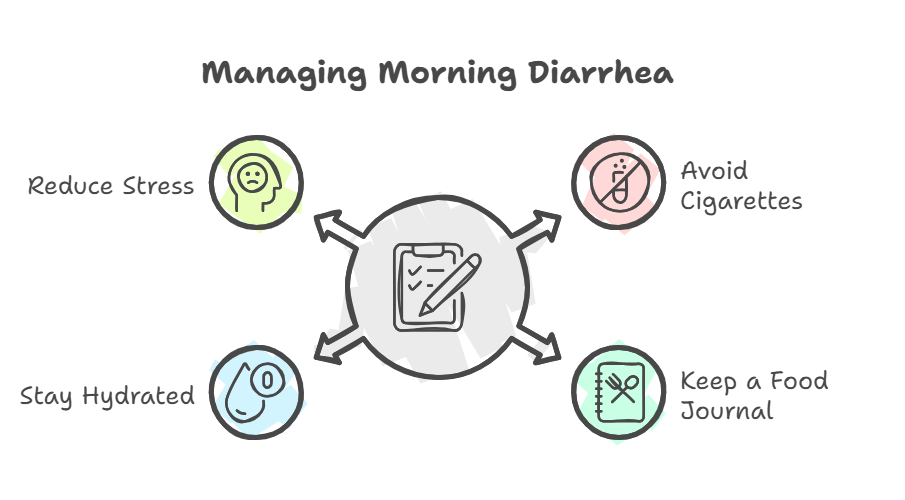Do you start your day with an unwelcome dash to the bathroom? Dealing with diarrhea every morning can be incredibly disruptive and concerning, impacting your daily routine and overall well-being. Understanding the underlying cause of this digestive health1 problem is the first step toward finding relief.
This persistent health problem might leave you wondering what’s going on. This article looks at what can cause diarrhea every morning. It covers diet choices and health issues.
Potential Causes of Morning Diarrhea
Diarrhea every morning can stem from various sources. Finding the exact cause is key to solving the problem. Causes can be temporary or signs of chronic diarrhea.
Infections
A common cause of morning loose stools is an infection in the gastrointestinal tract. These infections can be caused by viruses, common bacterial infections, or even parasites.
“Diarrhea every morning can result from various factors, including dietary choices, stress, and underlying health conditions. Identifying the root cause is essential for effective treatment. If symptoms persist, seeking medical advice is crucial to rule out serious conditions and develop a tailored management plan.”
Dr. Will Bulsiewicz
Bacterial infections, such as Salmonella or E. coli, may cause problems. They often come from contaminated food or water. Viral infections like norovirus and rotavirus can cause IBS symptoms. They spread easily, especially among children.
Irritable Bowel Syndrome (IBS)
Irritable bowel syndrome often causes ongoing bowel problems. It affects the large intestine. The condition’s development is unclear. However, researchers believe a few factors may play a role2.
Stress and changes to your daily routine can make symptoms worse, like diarrhea. Your food can make IBS symptoms better or worse. Some foods trigger symptoms in certain people, causing diarrhea every morning.
Inflammatory Bowel Disease (IBD)
Inflammatory bowel disease includes Crohn’s disease and ulcerative colitis. These conditions can lead to morning diarrhea. IBD leads to chronic inflammation in the digestive tract.
The inflammation can make the bowels move too quickly, reducing the time for water absorption and leading to watery stool. Managing inflammation through diet may also play a role in symptom relief. For example, a keto anti-inflammatory diet could support gut health and complement medical treatments. Learn more about how diet can help reduce inflammation here. Biologic medications can also significantly improve IBD treatment and provide relief.
Dietary Factors and Food Intolerances
Sometimes, what you eat or drink can directly contribute to morning diarrhea. Eating a lot of high-fat foods or drinking alcohol before bed can upset your digestion. This might cause loose stools the next day3.
Certain dietary habits are linked with waking up to diarrhea. Some people struggle to digest dairy or foods with lots of artificial sweeteners. This is especially true for those with lactose intolerance.
Medications
Certain medications, especially if taken before bedtime, might be a factor. Some medicines can cause bowel issues. This includes non-steroidal anti-inflammatory drugs, antacids, and antibiotics.
Taking medicine at night might cause diarrhea every morning stomach issues the next day. This happens because the medicine stays in your system while you sleep. These pills may cause watery stools. Some people might need antidiarrheal medications as a result.
Stress and Mental Health
Your brain and gut are more connected than you realize. This link shows how our feelings affect digestion. Stress hormones can alter the contractions in your intestines.
This can provide clues to what’s causing morning diarrhea. Research supports this, showing emotional states can impact gut health. A 2016 study found that people with IBS often experience more anxiety and depression. This can impact their bowel regularity and comfort4.
| Cause | Description | Potential Symptoms |
|---|---|---|
| Gastrointestinal Infections | Bacterial (e.g., Salmonella, E. coli), Viral (e.g., norovirus, rotavirus) | Loose stools, abdominal cramps, nausea, vomiting, fever |
| Irritable Bowel Syndrome (IBS) | Chronic condition affecting the large intestine | Abdominal pain, bloating, diarrhea, constipation |
| Inflammatory Bowel Disease (IBD) | Chronic inflammation in your digestive tract | Abdominal pain, diarrhea, weight loss |
| Dietary Factors | Consumption of trigger foods or beverages (caffeine, dairy, fat foods) | Loose stools, abdominal discomfort |
| Food Intolerances or Food Allergies | Adverse reactions to certain foods (e.g., lactose intolerance, gluten sensitivity) | Diarrhea, bloating, gas, abdominal pain |
| Medications | Side effects of certain drugs (e.g., antibiotics, laxatives) | Loose stools, change in bowel habits |
| Stress and Anxiety | Cause digestive distress, disrupt your gut | Diarrhea, changes in bowel movements |
Strategies for Managing Morning Diarrhea
To manage morning diarrhea, you need to change your diet. Here are some steps to help ease symptoms:

Keep a Food Journal
It helps you find links to what might be causing your symptoms. Tracking meals and noting when diarrhea every morning occurs helps people make better choices. This can reduce discomfort and support easier digestion.
Keeping track of every detail helps find triggers. This way, you can spot food and diet links to bowel issues. People can find out if foods like dairy, fatty foods, or gluten cause loose stools. Then, they can avoid those triggers5.
Often doing this often will improve the symptoms.
Stay Hydrated
Drinking plenty of fluids is vital, especially when experiencing digestive issues like diarrhea. Water helps the body stay healthy, so replacing what’s lost is critical to recover faster.
Choosing the right drinks will hydrate you well. They can also help restore balance in your body. Electrolyte solutions help replace key minerals lost from frequent loose stools, not just plain water.
Reduce Stress
Stress hormones affect gut health. Managing emotions can help prevent future diarrhea.
Incorporating exercises into daily life can significantly lessen emotional tension. Mindful meditation, yoga, and focused breathing help calm the body. This can slow gut movement and support healthier intestines through relaxation.
Stop or Avoid Cigarettes
Research implies nicotine could affect digestion and might worsen symptoms. More research is needed to confirm how smoking cigarettes directly affects diarrhea.
By reducing or completely stopping, can improve the digestive system.
When Should You See a Healthcare Professional
Contact a healthcare professional immediately if you see blood in your stool or have persistent abdominal pain/diarrhea every morning. Ignoring long-term diarrhea every morning can lead to serious health issues. It can drain your body’s resources and lower your quality of life.
This warrants quick professional evaluation. It’s important to seek medical advice. These could indicate more serious underlying issues.
Frequently Asked Questions
Why do I wake up with diarrhea every morning?
Waking up with diarrhea every morning can result from various factors. It could be something you ate, a reaction to stress, a food allergy, or a chronic condition.
What is IBS morning rush?
The phrase “IBS morning rush” refers to severe Irritable Bowel Syndrome issues that usually occur in the morning. It’s a condition where individuals experience diarrhea every morning along with abdominal pain and bloating. Engaging in physical activity might help. Consider doing movements to boost your energy and athleticism. This could help ease IBS flare-ups. You may want to learn to Perform These 3 Movements Every Morning to Increase Energy.
Conclusion
Having diarrhea every morning is disruptive. It can also signal underlying problems that may need medical help. You can boost your digestive health by managing your diet and stress. Use specific strategies to help you with this.
This helps improve overall wellness for anyone experiencing frequent episodes. Changing your diet can help manage bowel functions. It can also boost your well-being. This adjustment can tackle issues like poor sleep and help with food and drink timing.
Small Step, Big Impact
If you experience persistent morning diarrhea, consider maintaining a food and symptom diary to identify potential triggers. Consult a healthcare professional to discuss your symptoms and develop a personalized management plan.
- https://www.niddk.nih.gov/health-information/digestive-diseases/diarrhea[↩]
- https://sfsurgery.com/wp-content/uploads/2014/06/Irritable-Bowel-Syndrome.pdf[↩]
- https://www.health.harvard.edu/diseases-and-conditions/is-something-in-your-diet-causing-diarrhea[↩]
- https://www.healthdirect.gov.au/irritable-bowel-syndrome-ibs[↩]
- https://www.webmd.com/ibs/celiac-disease-ibs[↩]



